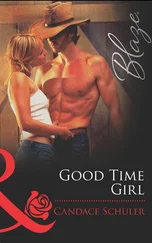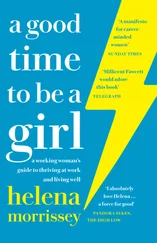KATA O’MARA
Good Time Girl

HarperCollins Publishers Ltd.
1 London Bridge Street
London SE1 9GF
Copyright © Kate O’Mara 1993
Kate O’Mara asserts the moral right to be identified as the author of this work
A catalogue record for this book is available from the British Library
All rights reserved under International and Pan-American Copyright Conventions. By payment of the required fees, you have been granted the non-exclusive, non-transferable right to access and read the text of this ebook on screen. No part of this text may be reproduced, transmitted, down-loaded, decompiled, reverse engineered, or stored in or introduced into any information storage and retrieval system, in any form or by any means, whether electronic or mechanical, now known or hereinafter invented, without the express written permission of HarperCollins ebooks
HarperCollins Publishers has made every reasonable effort to ensure that any picture content and written content in this ebook has been included or removed in accordance with the contractual and technological constraints in operation at the time of publication
Source ISBN: 9780006472599
Ebook Edition © MARCH 2017 ISBN: 9780008252687
Version: 2017-03-27
To Ted Rhodes, in happy memory
Cover
Title Page
Copyright
Dedication
Chapter 1
Chapter 2
Chapter 3
Chapter 4
Chapter 5
Chapter 6
Chapter 7
Chapter 8
Chapter 9
Chapter 10
Chapter 11
Chapter 12
Chapter 13
Chapter 14
Chapter 15
Chapter 16
Chapter 17
Chapter 18
Chapter 19
Chapter 20
Chapter 21
Chapter 22
Chapter 23
Chapter 24
Chapter 25
Chapter 26
Chapter 27
Chapter 28
Chapter 29
Chapter 30
Chapter 31
Chapter 32
Chapter 33
Chapter 34
Chapter 35
Chapter 36
Chapter 37
Chapter 38
Chapter 39
Chapter 40
Chapter 41
Chapter 42
Chapter 43
Chapter 44
Chapter 45
Chapter 46
Chapter 47
Epilogue
About the Author
Other Books By
About the Publisher
The studio was dark, silent and tense. The crew, technicians and production team were shrouded in shadow. Only the actors in their little world of a make-believe art gallery were illuminated in a bright pool of light. They stood poised ready to spring into life at a given cue – a flamboyant wave of a white handkerchief from Larry Matthews, the highly eccentric, camp floor manager/PA/script editor/general right-hand man to Hugh Travis, the producer. Larry always used this rather overt method of cueing, claiming that the actors could see it easily in their peripheral line of vision. He was right, of course; the slightest movement from anyone on the studio floor could be misinterpreted as a cue by an actor already fraught with nerves. Larry was usually right about most things. He ran the studio, and indeed the series, like a tight ship, loved and feared by actors and technicians alike. Now he stood, his head encased by ‘cans’, keeping an ever-vigilant eye on the monitor that was suspended above his head. The cameramen adjusted focus. The boom operators pushed the microphones in and out of the set, paying them out and winding them in again like trout flies, checking and rechecking for shadows. It was the soundmen’s difficult task to position the booms so as to be able to pick up every nuance from the actors. They had to achieve this without getting into shot, yet be near enough to hear even the most inaudible player. There was no difficulty with the experienced performers but the newcomers and those who had not had theatrical experience always posed problems.
Larry, ever watchful, glanced briefly around the studio, then up again at the monitor. Where -
A tall fine figure of a man, with a remarkably even golden tan and deep-set vivid blue eyes was threading his way through the hustle and bustle of Mayfair. His silver hair was a touch too long for a banker or a barrister, and proclaimed him at once a man connected with the arts. Women’s heads turned as he strode confidently along, his gaze firmly fixed ahead, a slightly worried look on his handsome chiselled features.
Back on the studio floor, Larry suddenly yelled, ‘Coming out of telecine in two minutes,’ thereby quelling even the faintest murmur of chatter and quiver of movement. The brightly lit actors braced themselves for the fray. The trick was to look and act perfectly naturally in a completely unnatural situation, the actor having to start exactly on Larry’s cue. In this instance, the responsibility lay with Geoffrey Armitage, an old hand at the game, who played Paul McMaster in the series, and Amy Brindle, a relative newcomer, who played Sophie, his receptionist, and who was learning fast.
Paul arrived at his destination and glanced up briefly with an air of ill-concealed pride at the name displayed above the premises. ‘McMasters’ it announced in discreet gold roman lettering on a very dark green ground. He paused for a moment to glance at the superb seventeenth-century Flemish painting that was the sole exhibit in the window, then pressed the intercom. A distorted voice responded immediately.
‘Good morning, sir.’ A buzzing sound indicated that he was given admittance.
‘Stand by, studio. Coming out of telecine in one minute!’ Larry’s voice was now lower both in volume and pitch, and had the effect of concentrating everyone wonderfully. His eyes were staring at the monitor.
‘Morning, Sophie.’
‘Paul, thank goodness you’re here. Helen has been on the phone. There’s been some sort of mix-up over the German consignment.’
Paul McMaster put a weary hand to his brow. ‘Oh God, can’t she handle it? I’ve got a meeting this morning.’
‘There’s a fax from Mr Van Geldes from Amsterdam, about the exhibition at the Rijksmuseum.’
‘Yes, good. I was expecting that, anything else?’
‘Yes,’ said Sophie, looking embarrassed, ‘your brother …’
‘What’s he done now?’
‘I’m afraid he may be responsible for the confusion over the Hamburg shipment,’ she replied, becoming more flustered by the minute.
Paul sighed heavily. ‘All right, I’ll deal with it,’ he said resignedly, and crossed to the back of the shop. Sophie watched him go, then turned back to her desk with a troubled expression on her face.
There was a door leading to an outer office and a further door to an outhouse where restoration work and packing was carried out.
‘Coming out of telecine in ten seconds, nine, eight, seven, six, five …’ Five to zero were mimed by Larry using the fingers of one hand followed by the famous flourish of the white handkerchief descending in the manner of one starting a race and Geoffrey Armitage slipped smoothly and expertly through the studio office door, which exactly corresponded with the one in the telecine, and so achieved the transition from film to live studio. He spoke his lines on cue easily and effortlessly, with just the right amount of energy and charm to make him immensely watchable and adored by several thousand female admirers.
‘Who said you could use my office?’ snapped Paul McMaster.
An extremely good-looking man in his middle thirties was lounging nonchalantly in the leather captain’s chair with his feet up on the desk in front of him.
Читать дальше













